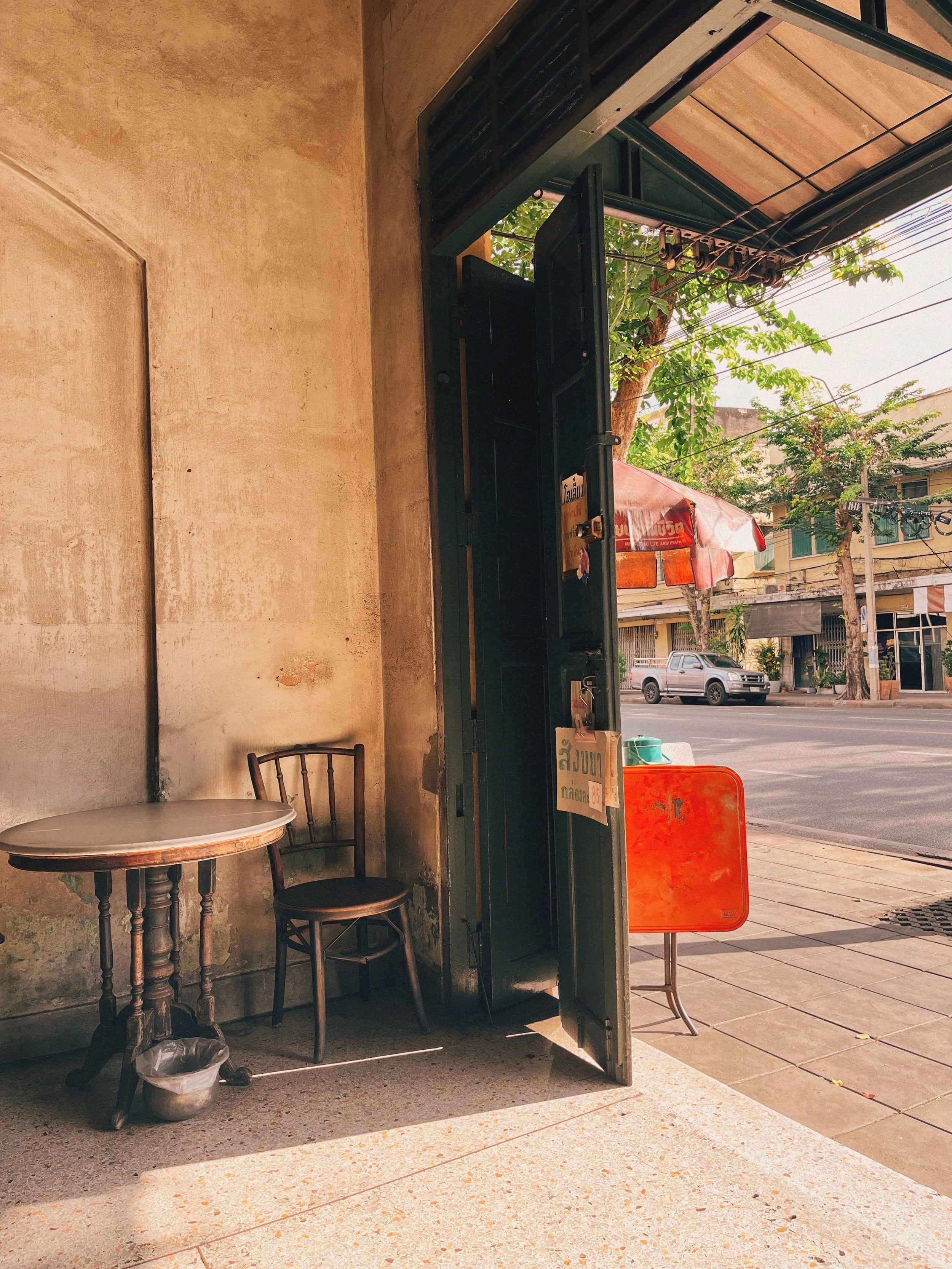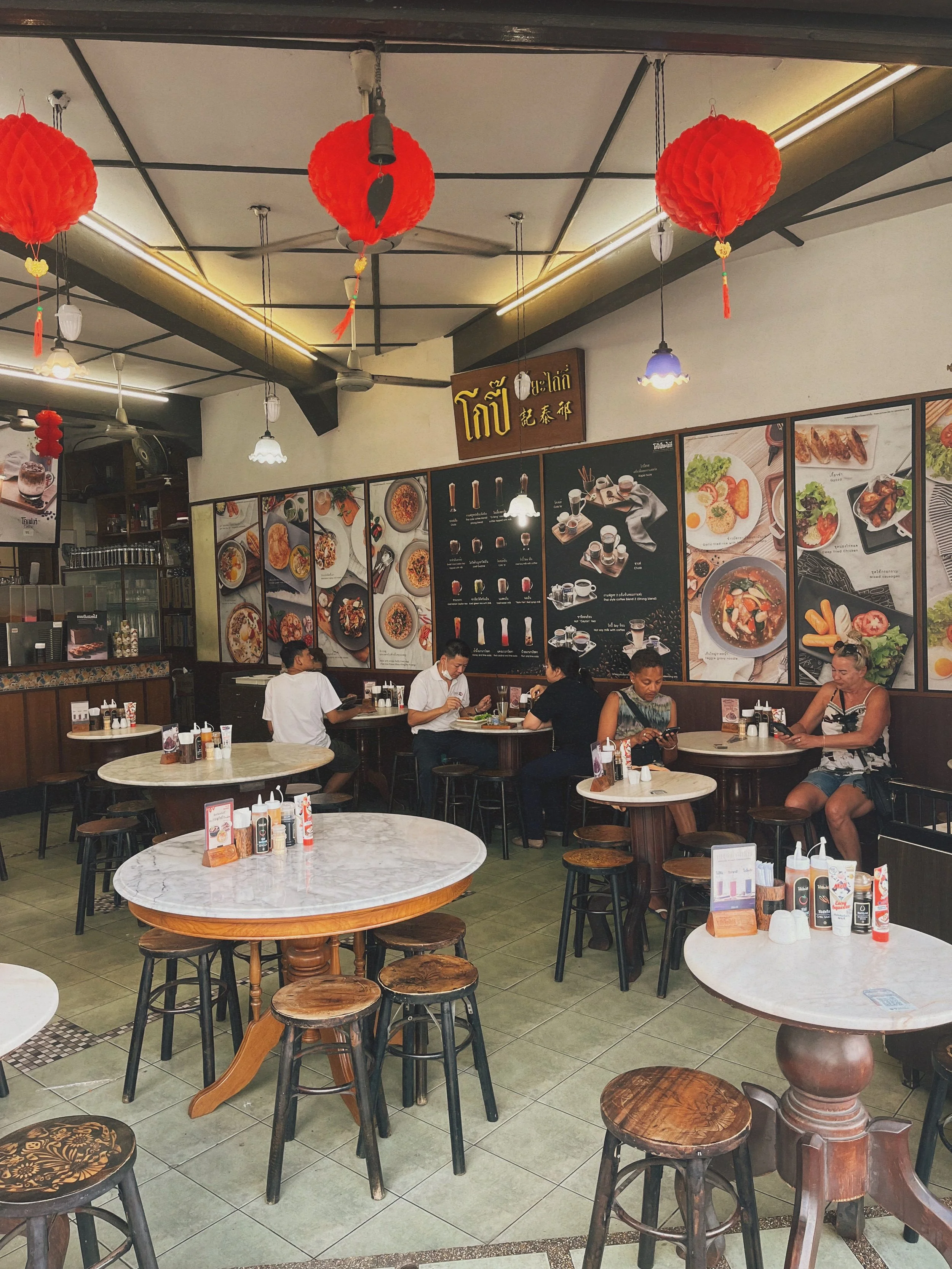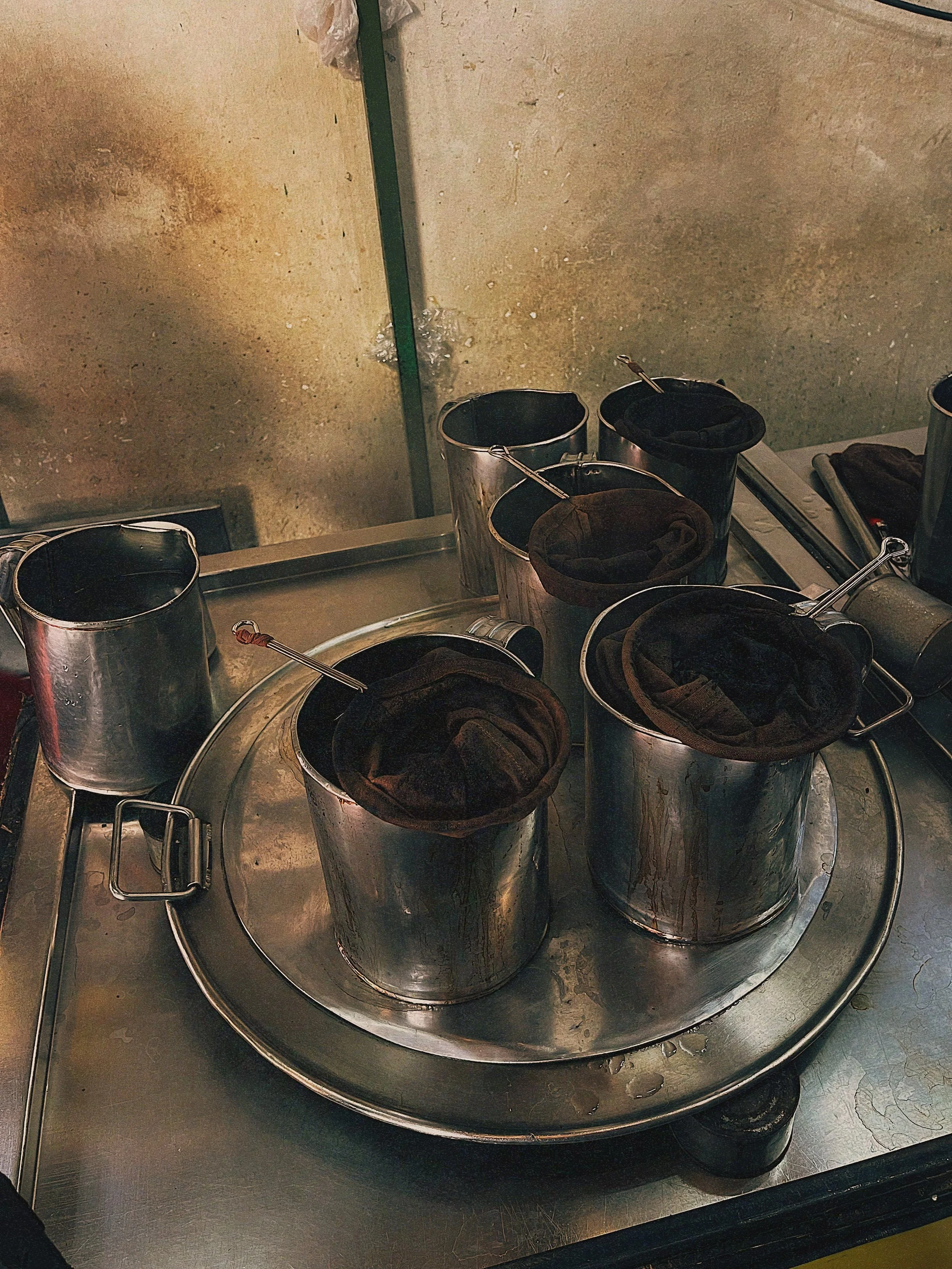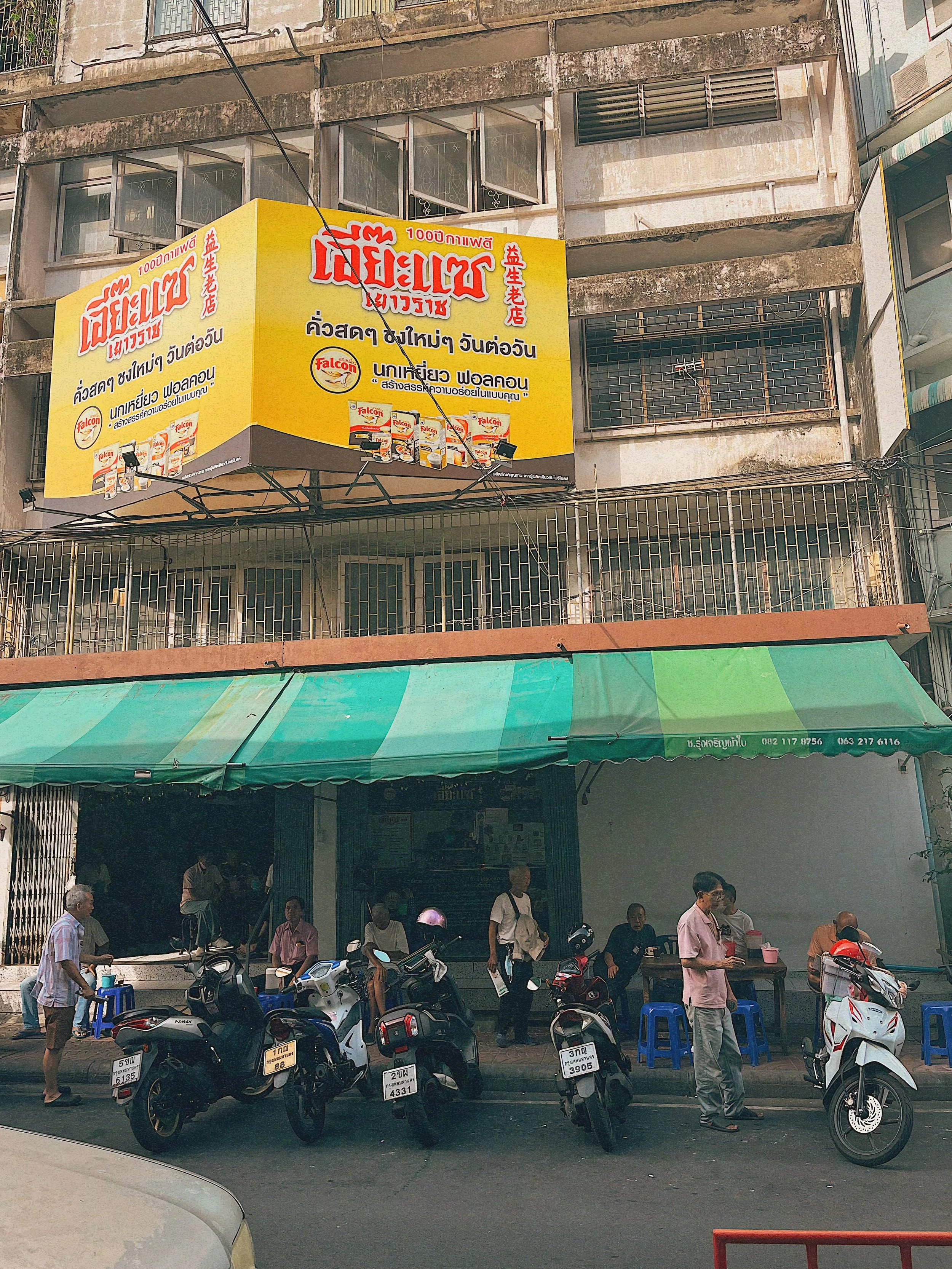A one-woman expedition through Bangkok’s nostalgic cafes
Ek Teng Phu Ki
Shabby interiors, no aircon and most definitely no wifi or plug sockets—it should be a remote worker’s worst nightmare, and yet each morning I’ve found myself venturing to yet another of Bangkok’s old-school cafes. These traditional coffee shops have been around for decades, passed through generations of the same family’s hands. Most look as though the interiors (and the menus) haven’t changed at all over the years; peeling walls, vintage fridges, spinning ceiling fans and stacks of Milo, Ovaltine, and condensed milk line the walls. That’s the appeal. As beautiful as the city’s contemporary cafes are, I could just as well be sitting in a cafe in London. And while I know that the trendier coffee shops are the realities of Bangkok’s present and future, the tourist in me wants to feel like I’m in another place and time. So I’ve set myself on a self-assigned quest to try as many of these old-school cafes as possible (that and the taste of the traditional Thai iced coffee).
Nam Heng Li
I heard about these cafes before my trip when I was researching the city for an El Camino Travel guide. When I’m writing these guides, I try to include a combination of older businesses alongside trendier ones. Truthfully, I’m never fully sure if the inclusion of newer cafes contributes towards the gentrification of the area (which is why I feature both). Though the new ones may also be small independent businesses that I want to support, the older ones feel like a piece of history that we’re losing rapidly in a wave of characterless venues. In Bangkok, I keep reading about the pace at which the city is changing which only fuels my urgency to see as many of these old-school spots as possible. During one of my ventures, I make a note that sometimes it feels as though we travel to see a world that’s being swallowed by capitalism; last chance tourism to see disappearing environments, cultures and heritage alike.
Kope Hya Tai Kee
I begin my quest at Ek Teng Phu Ki (see first image of the post), a beautiful spot in Yaowarat that’s been sitting house for more than a century. Other family-run businesses in Bangkok’s Chinatown have been forced to close in recent years, but Ek Teng Phu Ki is now in its fourth generation of ownership. Its continued success is apparently down to its recent renovation—jade tiles, red lanterns, marble tables and vintage Chinese-inspired interiors have worked to draw in a much-needed younger crowd that mingles with the old. It’s where I have my first taste of oliang—traditional Thai-style coffee that’s filtered through a coffee sock (see pics below), with brown sugar and cardamon, poured over ice and topped with condensed milk for added sweetness (though I think each place has their own version). The Ek Teng Phu Ki recipe doesn’t taste like any coffee I’ve had back home and I’m addicted from the first sip. It’s also where I try kaya for the first time, a custard or jam made with coconut cream, sugar and eggs, served with toast.
Kaya custard, steamed bread, egg and Chinese sausage at On Lok Yun
Also on the menu of most of these cafes; extremely soft-boiled eggs served in a shot glass (I hate runny eggs so I gave this one a miss); Milo toast - buttered toast sprinkled with chocolate power and condensed milk; and American-inspired breakfast sets. In On Luk Yun—the only spot I had to queue for—they’ve been serving Western-style Thai breakfasts since 1933. I opt for a fried egg with bacon and Chinese sausage (thin crispy slices that are, of course, sweeter and more flavoursome than your regular sausage), and thick steamed white bread with a side plate of kaya jam.
I repeat this routine each day. New morning, new (or rather old) coffee shop. In Nam Heng Li, I’m the sole visitor in an apparently deserted area, other than the very old shop lady who serves me iced coffee and kaya toast for 30 baht (66p). In Easae, it truly feels a world away from the aesthetic cafes, packed with Thai-Chinese grandads who seem quite content enjoying each other’s company and watching the world go by. Not a laptop or phone in sight, it seems the sort of place where they come alone and strike up a conversation or game of chess, which reminds me of another disappearing phenomenon for my generation: the Third Space.
The Grandad’s Club
The furthest afield my quest takes me is to a 100-year-old coffee shop hidden at the back of a non-descript market in Thonburi (the other side of the river where most tourists don’t tend to go). It’s a bit of a trek to get to, but there’s a reward. Chinese breakfast doughnuts with a side of condensed milk (what else), served along the canalside with a giant Golden Buddha directly in sight. Life lesson: follow your interests obsessively; you never know where they may lead you.
Here’s a list of the places I’ve tried:
Ek Teng Phu Ki - my favourite spot. Beautiful interiors tucked behind the main road in Yaowarat. The coffee taste is very distinctive here - it might be too strong/sweet for some but I recommend trying.
Mit Samphan Traditional Coffee - this is a short walk away from Ek Teng Phu Ki with seating in a narrow alleyway. It was too busy to sit and eat but the coffee was great. If you find Ek Teng’s too strong, then try here instead.
Easae - also a short walk away from the two mentioned above. This seemed to be the local hangout for grandads (it was packed). I didn’t try the food here so can’t comment on that.
On Luk Yun - for me, this had the best kaya custard, served on its own plate in a pool of condensed milk. I dread to think about how much my daily sugar intake has risen while I’m here. I did have to queue but it went down very quickly. Also recommend the Chinese sausage.
Kope Hya Tai Kee - this one’s in a nice location and will probably be the closest one if you’re staying in the main tourist area (which might explain why the prices are a lot higher than the others. An iced coffee here was 95 baht so about 2-3x the price of the others). However, it’s nice to sit in and they have a big range of breakfast options to choose from. I went for the pad kaprao (the fried egg was more like a deep-fried scrambled egg and was a bit too oily for me in the morning). On the same street, you can find a cute bookstore and at the end of the road is the famous Jay Fai.
Nam Heng Li - this one felt super old school and was insanely cheap. It’s very small with just a few tables however it was empty when I went. My kaya toast was a bit dry (however I’m sure I could have asked for more). She sells big tubs of kaya custard to take away too.
Suriya Coffee - amazing location along the riverside in Thonburi with the nicest owners. It’s a bit of a trek so I would advise coming only if you’re in the area (a few companies offer bike tours of Thonburi which I’ve heard great things about).
Suriya’s Coffee - spot the big Buddha in the background






